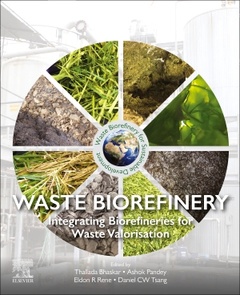Waste Biorefinery Integrating Biorefineries for Waste Valorisation
Coordonnateurs : Bhaskar Thallada, Pandey Ashok, Rene Eldon R., Tsang Daniel C.W.

Waste Biorefinery: Integrating Biorefineries for Waste Valorisation provides the various options available for several renewable waste streams. The book includes scientific and technical information pertaining to the most advanced and innovative processing technologies used for the conversion of biogenic waste to biofuels, energy products and biochemicals. In addition, the book reports on recent developments and new achievements in the field of biochemical and thermo-chemical methods and the necessities and potential generated by different kinds of biomass in presumably more decentralized biorefineries.
The book presents an assortment of case-studies from developing and developed countries pertaining to the use of sustainable technologies for energy recovery from different waste matrices. Advantages and limitations of different technologies are also discussed by considering the local energy demands, government policies, environmental impacts, and education in bioenergy.
I General 1. Waste carbon resources for waste biorefinery: strategies for sustainable recycling 2. Sustainable development goals (SDGs) and role of waste biorefinery 3. Energy and Environment 4. Advances in Conversion processes for complex feeds/streams
II Integrated Biorefineries/Waste Valorization 5. Food waste biorefinery 6. Case study: Food waste biorefinery 7. Case study: Edible crop biorefinery 8. Municipal solid waste biorefinery 9. Case studies for MSW biorefinery 10. Sewage sludge biorefinery 11. Case study of sewage sludge biorefinery 12. Pulp and Paper biorefinery 13. Aquatic biorefinery: Azolla, water hyacinth
III Associated studies 14. Biorefinery emissions (e.g., Greenhouse gases, LUC, ILUC, LCS, etc.) 15. Techno-economic studies 16. Life-Cycle Analysis: Present status and challenges 17. Footprints (e.g., Carbon and water, etc.) 18. Balances (e.g., Energy and exergy, etc.) 19. Supply chain optimization
His 20 years of research experience cover various fields of science revolving around his expertise in heterogeneous catalysis thermo-chemical conversion of biomass, waste plastics and e-waste plastics into value added hydrocarbons. He has prepared several catalysts and thrown a light on the structure activity relationships of novel catalytic materials for hydrotreatment of fossil based crudes. His contributions to the field of sustainable hydrocarbons are in the form of process knowhow and catalyst developments. His patents and publications discuss crucial points encompassing wide areas of thermo-catalytic conversion like pyrolysis and hydrothermal liquefaction for biomass (agricultural, forest residues and aquatic biomass) and plastic waste (industrial and e-waste) conversion. In addition he worked on developing micro-channel reactors for several chemical reactions and separation processes. His other interests include utilization of non-conventional energies for the sustainable production of hydrocarbons utilizing the polymeric wastes available which will make the thermo-chemical methods of conversion more energy efficient.
In view of his expertise, he is on the edito
- Provides information on the most advanced and innovative processes for biomass conversion
- Covers information on biochemical and thermo-chemical processes and products development on the principles of biorefinery
- Includes information on the integration of processes and technologies for the production of biofuels, energy products and biochemicals
- Demonstrates the application of various processes with proven case studies
Date de parution : 03-2020
Ouvrage de 756 p.
19x23.3 cm
Thème de Waste Biorefinery :
Mots-clés :
Agricultural residue; Agroindustrial wastes; Anaerobic digestion; Anaerobic wastewater treatment; Biochar; Biochemical conversion; Biochemical process; Biodiesel; Bioenergy; Biofertilizer; Biofuels; Biogas; Biomass valorization; Biomass; Biomaterials; Biopolymer production; Bioproducts; Biorefineries; Biorefinery; Biowaste; Blended feedstock; Blends; By-products; Carbon footprints; Castor seed; Chemical synthesis; Chitin; Chitosan; Chromium; Combustion; Composting; Crude oil; Crustacean waste; Decision making; Decision-supporting tool; Downstream processing; Eco-industrial park (EIP)Industrial symbiosis; Efficiency; Electricity generation; Engine; Environmental impacts; EPS; Expanded granular sludge bed; Fast HTL; Food consumption; Food waste management; Food waste recycling; Food waste valorization; Food waste; Fuel; Fungal chitosan production; Gas conditioning; Gasification; Green biomass; High-strength wastewater; Hybrid anaerobic reactor; Hydrothermal liquefaction



